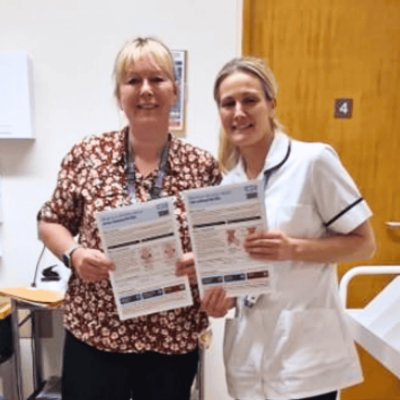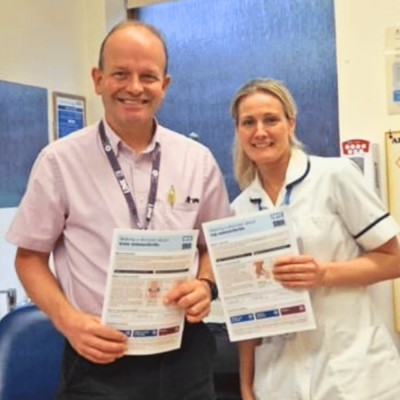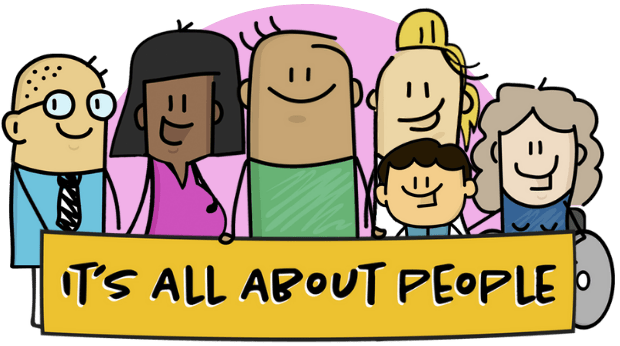Promoting Shared Decision Making and Decision Support Tools
What we did
In 2023, the It's All About People team expanded by welcoming two clinicians - Nicola and Alison - who each joined us for one day a week. Both were Band 6 professionals seeking new challenges and opportunities to develop their skills.
Together, they took on the task of promoting NHS England’s Decision Support Tools (DSTs) across Lincolnshire.
Their goal was simple but powerful: to help colleagues and people using services understand how these tools can make healthcare decisions more collaborative, informed, and person-centred.

Starting with Osteoarthritis
We began with the Hip and Knee Osteoarthritis Decision Support Tools. These were taken out to local people for co-production and review.
We asked people how useful the tools were and when in their osteoarthritis journey they’d find them most helpful.
Their feedback went straight to NHS England and helped us create local versions of the tools, including links to further support such as:
We also worked with colleagues from across the MSK (musculoskeletal) pathway, who shared that they hadn’t realised such useful resources existed.
To spread awareness, we offered in-house training sessions at hospital sites and reached out to every MSK provider to offer tailored sessions on using the tools effectively.

What we found
Clinicians told us that the DSTs were genuinely helpful. They supported more meaningful conversations with people, shifting away from a “question-and-answer” style towards a shared exploration of information and choices.
Instead of clinicians providing all the answers, both parties could navigate the tools together, creating a more equal, trusting relationship.
Colleagues also appreciated the support our team provided, as it gave them access to updated resources and fresh ideas, something they often struggled to find time for themselves.
Embedding better communication
Alison has become a lead facilitator for the Hospital Trust’s “Hear It My Way” training days. Through these sessions, she’s seen how communication breakdowns can lead to complaints - and how DSTs could have prevented confusion or misunderstanding.
Her training helps professionals who think they already practise Shared Decision Making to reflect more deeply on what that truly means in everyday care.
Growing our impact
The two osteoarthritis tools are now included as examples in the accredited Shared Decision-Making training, delivered by Alison and Nicola. Alison also leads a monthly workshop: “What is a Decision Support Tool?”
These efforts have paved the way for introducing 13 more DSTs across other specialisms. We’ve already shared:
-
Frailty-related tools with Primary Care colleagues as part of the Frailty Service redesign
-
The Diabetes DST with Community Nursing teams


Jody Blow of ACP Orthopaedics (pictured above with Alison)
"I feel they would be very useful, possibly will be most beneficial, when people first visit their GP with hip or knee Osteoarthritis, and then definitely to be reiterated when they come to us in the clinics.
"It would save a lot of unnecessary referrals - and it puts the person in the driving seat of their care.
I think it's fab that we can have this kind of collaborative approach to communication with people. It gives them so much more involvement in the management of their care, and it sets out expectations very well, too."


Mr Mark Rowsell, Orthopaedic Consultant (pictured above with Alison)
"I would encourage you all to have a look at these NHS documents, which have been produced to aid people with decision making with regard to hip and knee replacements.
"They are very helpful, and in one way or another, could be integrated into our hip/knee care pathway - ideally in primary care, prior to referral to clinic.
However, they would also be helpful in clinic, as they demonstrate that, for those people that go ahead for surgery, the decision-making has been a shared process."

What the evidence shows
So far, 244 colleagues have benefited from hearing about DSTs and learning about the value of Shared Decision Making.
We’ve heard personal stories too - such as Theresa’s experience, shared in Episode 23 of the It's All About People Podcast, and positive feedback from people referred to Orthopaedics.
The emerging picture is clear: when people are supported to take a shared approach to their care, they become more active, informed, and confident partners in their own health decisions.
This is also helping to build a new culture across our services - one based on collaboration rather than hierarchy.

What we’ll do next
While we’ve made great progress, there’s still more to do.
Our data shows that Shared Decision Making is happening, but not consistently. Many people still don’t fully understand their role in these conversations, and a shift away from the old “Doctor knows best” mindset is still needed.
We plan to:
-
Continue rolling out DSTs across NHS services
-
Share learning with partners across the local health and care system
-
Encourage a culture of openness and equality in every care setting

Why this matters
Shared Decision Making is at the heart of Our Shared Agreement and is key to building better relationships between people and the health and care system that supports them.
It empowers people to have their say in their healthcare, while also giving a voice to those who might feel less confident to speak up.
And it turns a medical “transaction” into a human conversation - one built on respect, listening, and partnership.

What success will look like
We expect to see:
-
More recorded evidence of Shared Decision-Making conversations and use of DSTs in clinical systems
-
A wider range of NHS England tools shared through our training and service redesign work
-
People telling us they feel more involved in their care — and truly understanding what that means
Achieving this will also help us build a more engaged and empowered population, aligning with ongoing work around the Patient Activation Measure.







